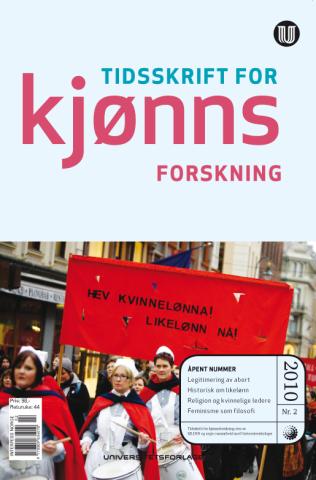Open issue

Articles
Merethe Flatseth:
Principal conceptions of women in abortions politics
A key premise in the Norwegian parliamentary debates on abortion is that it involves a painful and difficult decision for a woman. A metaphor of the female mind as a physical, fragile structure provides the basic logic for these arguments, whether for more liberal or more restrictive abortion practices. Consideration of "the woman under pressure" creates a framework for the debate. But giving woman a heavier burden to bear in an already stressful situation has a drawback: it implies that increased stress involves a potential danger to mental health. This notion of burden promotes an ethical standpoint that links ethics not to the woman’s right to choose but to the way she makes her decision. The "expectation" that a woman seeking abortion should experience vulnerability and moral anguish may possibly be created by society’s need to deal with the ethical dilemmas of abortion. The notion of the vulnerable woman somehow eases the pressure on abortion politics because it involves an experience of abortion as painful and difficult, which acts to both discipline and liberate women.
Keywords: metaphor, discourse, rhetoric, ethics, abortion debate, abortion politics, prenatal diagnoses, ultrasound scan, woman, subjectivity
Inger Bjørnhaug:
Equal pay between markets, classes and gender. The Norwegian Confederation of Trade Unions, women and the question of equal pay 1935–1970
The article explores the question of equal pay in the Norwegian Confederation of Trade Unions (LO) between 1935 and 1970. It frames this in the context of tensions between three factors: the market, where women’s value on the labour market was strongly influenced by the male breadwinner economy; class, where skilled workers in heavy industry represented the ideal; and gender, which was not acknowledged as a distinct issue by the LO. The article considers equal pay as an ambiguous and changing concept, and originally as a defence for skilled men against unskilled women. For women, the main struggle was the right to have any waged work at all. In the 1920s and 30s this struggle created a strongly radicalised female opposition in the LO. These worker-feminists claimed gender rights within the LO and argued strongly against the special tariffs for women. In 1959 the Norwegian parliament finally ratified the International Labour Organisation’s (ILO) convention of equal pay for equal work, and the women’s tariffs had to be discarded. The LO leadership, viewing the women’s tariffs as obsolete and undemocratic, engaged in this struggle. But when the question arose as to how to categorise the different tasks, the Norwegian employers organisation (NAF) – which refused to acknowledge that the value of women’s work was equal to men’s – was able to get most of the traditional women’s tasks placed in the lowest paid groups. The equal pay agreement was then implemented in the narrowest possible way and did little to increase women’s wages. During the decades following the 1970s, equal pay remained an unresolved issue. This was the case despite women’s waged work having become the norm and the LO having undergone a thorough change of composition, both regarding class and gender. This illustrates both the influence of market relations on LO wage policy and the importance of politics for solving the equal pay question.
Key words: equal pay, equal pay for comparable work, evaluation of work, women’s tariffs, The Convention of equal pay, Worker feminists, The Norwegian Confederation of Trade Unions
Torjer A. Olsen:
Naming gender. Gender equality and Laestadianism 1960–1980
The article is an analysis of the discourses on female ministers and equality of the sexes in Lyngen Laestadianism in the period between 1960 and 1980. This period starts with the ordaining of the first female minister in the Norwegian state church, of which Lyngen Laestadianism is a part. The ordaining created a huge response from the Laestadian preachers, the undisputed leaders of their congregation. They speak of female ministers as infidels and traitors that purposely upset God’s vocation and order. The preachers also see female ministers in the context of a degenerating society. Thus, female ministers and the fight for the equality of the sexes are seen as expressions of the same thing, a society abandoning God. However, the Lyngen Laestadian discourse is not static. During the 1970s, it showed a tendency towards speaking about the equality of sexes in a different, more positive way. The particular discourses on female ministers and the equality of sexes have made an impact on the general Laestadian discourse on gender. As a result, the patriarchal tradition is both strengthened and contested.
Key words: gender, religion, Laestadianism, conservative Christianity, patriarchy, church, female ministers
Ingeborg Owesen:
The modern (philosophical) history of feminism & the case of Marie le Jars de Gournay
This article argues in favour of the importance of historicizing feminism and how, according to the author, this will reveal that feminism is an ongoing process which is far from finished. The article supports the view that feminism is an intellectual tradition in its own right and a system of thought with a dynamic relation to philosophy. This is illustrated by a presentation and reading of Marie le Jars de Gournay (1565–1645), who was probably the first thinker ever to pro-pose equality between men and women. Gournay hence initiates modern feminist thought, which correctly takes equality/difference as its point of departure.
Key words: history of feminism as modern and philosophical, Simone de Beauvoir’s history of feminism, Marie le Jars de Gournay, Origin of ‘equality